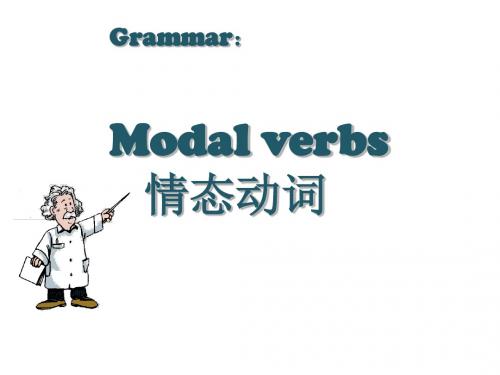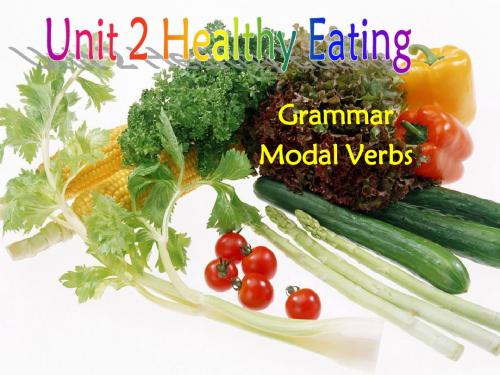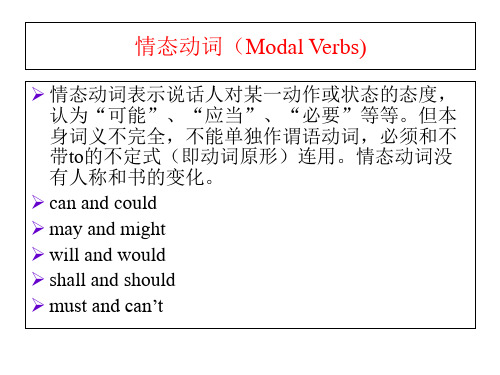语法学案情态动词Modal Verbs课件
语法 Modal Verbs情态动词 课件 2021-2022学年高中英语人教新课标必修三

I commanded that you (should) go to the front immediately.
重点语 法规则!
宾语从句
从句的谓语:should+动词 原形,其中should可以省略
虚拟语气
常见的,后接宾从要用虚拟语气的动词还有:
四个“要求”:request, require, demand, desire
Your parents will try their best to help you. 你的父母会尽最大努力帮助你。
用法:
① 表示义务、必要或命令 : You must come early tomorrow.
② 表示推测“肯定,一定”: They must be at home. The light is on.
Tom can swim. =Tom is able to swim.
汤姆会游泳。
can
(could)
(疑问句中)表示 请求
可以 Could you give us a hand?
你可以帮我们一下吗?
(否定句、疑问 句中)表示可能 性
The boy can’t be Jim. He’s can可能 much taller.
2. 实义V.
肯:dare to do 否:don't dare to do
e.g.: I dare to swim . He doesn’t dare to swim.
1. You ____to the meeting this afternoon .
A needn’t to come
B don’t need come
need 需要,有必要
1. 情态V, 肯:need do 否:needn't do
译林版高一英语下册必修四Unit2Modal Verbs 教学ppt课件(51张)

若用could, 可用于任何句式 3.表示 推测,通常用于否定句和疑问句中, _______c_a_n_’__t__/__c_a_n__n_o_t_译__为__“__不__可能”。 —Listen. Someone is knocking at the door! Who
5.表示 惊讶、怀疑、不相信的态度(主要用于否定 ______句__、__疑_问__句__或__感__叹_句__中__)__。____
How can you be so rude to your girlfriend in public !
习惯用法“ cannot/ can never…too/enough…” 6.表__示_:_无__论_怎__样__…__…__都_不__过__分__或__越__…_…__越_ 好。
a man from Japan could eat 53 hot dogs in 12
minutes.
过去的能力
Attention:can/ be able to的区别
1.can 只有现在时和过去时could, 而be able to 则有更多的时态变化,在将来时、 完成时和非谓语动词中只能用be able to。
2.Everyone can make mistakes. —_____it be David?
may/might(not) have done It _____be her. Here is the key. Shall用于____________________________。 He needn’t have his hair cut, because it is a fashion. You ___________. would 表示过去的习惯性动作(不表状态),现在有可能还如此,也可能不再那样。 _______________________________
情态动词语法讲解PPT课件

2表示“许可”和“不许”
a)请求对方“许可”可用can, could, may, might.
may/might较正式,could/might较委婉
表示给予“许可”通常用can/may,而不用 could/might
Could I use your phone? Yes, of course you can. Might I trouble you for a light? You may indeed.
表示将来的“必须”,常用have to的一定 形式(will/shall have to) 比较:
•We must do it again.(表示现在)
•We’ll have to do it again.(表示将来)
•表示过去的“必须”,常用had to
•I had to leave at six yesterday.
•They must be home by now.(他们现在一定到家了)
will/would表示“推测”可有三种情况
1)对特定事态的推测
A: Who’s that man over there? B: That will be George, no doubt. C: That would be George, I except.
• Can they have missed the bus?
• Yes, they may have.
may not重音落在助动词上,表示 “不可能”,重音落在否定词上,表 示“不许可” , 比较:
•He may not go tomorrow.
•He may not go tomorrow.
•所以在书面语中,表示“不可能” 常用can’t
高中英语课件-Grammar-modal verbs

一、表示对过去事情的推测或估计 1. must have done “想必或肯定已经做了某事”
eg: The ground is rather wet, so it must have rained last night.
2. may/might have done “可能/大概已经做了某事” eg: Tom may have gone to shanghai, but I still not sure about it.
tickets? There_____be twelve.
A.should
B. would
C. will
D. shall
5. shall
1. Shall 与第一、三人称连用,且用在疑问句中时, 表说话人征求听话者的允诺。
1) Shall we begin our discussion? 2) Shall the driver wait?
2. shall的主语是第二、三人称的陈述句,表示说话人 的允诺、警告、命令等语气。
Eg: 1)You shall get the book tomorrow. 允诺 2) He shall be punished. 警告 3) You shall go with me. 命令
一What does the sign over there read? 一“No person ________ smoke or carry a lighted cigarette,cigar or pipe in this area.”
3. 表推测,用于肯定句,意为“一定”“务必”。
Eg: 1) Betty must be in the next room. 2) He must be watering the flowers in his garden.
初中英语情态动词:modalverbs课件人教新目标版

• 2). 你昨天一定看到她了,对不? •You must have seen her yesterday, didn’t you?
7
•三点说明
•1、情态动词 + v 表示对现在或将来动作的猜测。 • 情态动词 + have + p.p表示对过去动作的猜测。
•2、情态动词的过去式与原形相比,多点礼貌,少点冒昧, • 语气更为委婉。
•其形式为:must + have +p.p •Eg. The road is wet. It must have rained • last night.
6 •must的用法
1. must 表示推测时,其反意疑问句应根据动词的实 际时态而变化。如:
• 1). He must have a car now,_•_d_o_e_s_n_’_t _h_e__?
have
to.
•④
NeedIfinishit•Yes, you must. now?•No, you needn’t.
8
•典型错误
•1. He mustn’t be in the classroom. ( •Can’t ) •2. You might leave the bag on the desk. •(might have left )
•3.情态动词在一般疑问句中的回答: •① Can you sing? •Yes, I can.
•No, I can’t.
•② May I come in?•Yes, you may.
•No, you mustn’t/you can’t.
•③
Must
I
hadn’t
中职英语语法情态动词教学课件

3.can和be able to辨析 can(could)和be able to都可以表示能力,意思上没有区别。但can只有现在式和过去式, 而be able to则有更多的形式。如:
表示猜测(不可能)
➢7. They (can not/may not) __c_a_n_n_o_t________ still be out, the light is on in the house.
➢8. You (couldn’t/might not) 表示许可 ____c_o_u_ld__n_’t_______ smoke on the bus.
则在助动词之前。疑问句中, 情态动词放在主语之前。 I can see you. Come here. 我能看见你,过来吧。 He must have been away. 他一定走了。 What can I do for you? 你要什么? How dare you treat us like that! 你怎么敢那样对待我们!
三.shall和should
情态动词
用法
例句
shall
用于第一、三人称构成的疑问 1. Shall I open the window?
句,表示征求对方意见或请求 2. Shall we say 6 o’clock, then?
指示,其意为“要不要”、“… 3. Shall he come to see you? 好吗”:
I’ve always wanted to be able to speak fluent English. Those bags look really heavy, are you sure you’ll be able to carry them on your own?
人教版高一英语Book 3 Unit 1 语法:情态动词 Grammar Modal Verbs课件[内嵌音频](共23张PPT)
](https://img.taocdn.com/s3/m/b56df0754b73f242336c5f6b.png)
本来能够做却没做
should/ought to have done
本来应该做却没做
shouldn’t/oughtn’t to have done
本来不该做却做了
needn’t have done
本来不必做却做了
DESIGNED BY Mr.Fan
1. ---Guess what! I have got A for my term paper.
A. can’t
B. wouldn’t
C. shouldn’t
D. needn’t
4. She ______ have left school, for her bike is still here.
A. can’t
B. wouldn’t
C. shouldn’t
D. needn’t
DESIGNED BY Mr.Fan
5. He ___B_______ have completed his work;
otherwise, he wouldn’t be enjoying himself by the seaside. A. should B. must C. wouldn’t D. can’t
3. 表请求或许可(表请求时,could比can语气更委婉)
Can/Could I use your dictionary?
Could you lend me a hand?
DESIGNED BY Mr.Fan
1. Michael ____B___ be a policeman, for he’s much
对现在的推测
must have done
must do
M4U2 modal verbs(公开课课件)

A.can B.may C.have to D.must
3.Certainty (可能性) :
Although the chance of winning a
medal is small, I’ll try my best!
Shi Dongpeng _m_i_gh_t_ win a medal at the Olympic games.
5.Making requests (提出要求):
I don’t know how to use this equipment!
_C_a_n_you help me with my training?
6.Making suggestions (提出建议):
It’s too hot to take exercise
seconds ago.
A.may
B.might C.must
—They___ be doing the experiment in the lab. —Why? —Because the lights are still burning.
A.could C.must
B.can D.would
4.Permission (允许):
in the afternoon.
S_h_a_l_l we do the training in the morning?
shall: 1.Shall用于第一、第三人称疑问
句中,表示说话人征求对方的意 见、向对方请示或提供帮助 。
1.Shall we begin our lesson? 2.When shall he be allowed to
3. 表示惊讶, 忧虑, 惋惜等感情色彩。
I am really surprised that he
语法辅导课件-Modal verbs

Conclusion 4
shall
(不表推测) (1)用于第一、第三人称的疑问句,表征求对方意见 或请示 (advice,permission) (2)用于第二、第三人称的陈述句,表说话人的命令、 警告、允诺、威胁等语气 (order, warning, promise, threat) (3)*表示强制,用于法令、条约、规章中,意为 “必须,应该”。
1. There is nothing to do, so I may as well go to bed. 2. He may well feel proud of his daughter.
Conclusion 2
3. will/ would
(1) 表示请求、建议等 (request,advice etc) • Will you (please) help me with my English? • Would you (please) pass me the book? (2)表示意愿,决心等。(willingness)will表示现在的意愿, would表示过去的意愿。“会,愿意” • Go where you will. • She asked if I would go with them. • I will never do that again. • No matter what I said, he won’t listen to me.
相当于情态动词的 have to
Functions of Modal Verbs
• • • • • • Ability Advice Agreement Guessing Past habit Necessity • • • • • • Permission Possibility Prediction Promise Request intention
第二单元情态动词课件Modal_Verbs

My mother cooked a lot of food for me. She has been cooking all the morning.
She must be tired now.
I have just eaten a lot of food for lunch.
can’t You can t be hungry now.
5.The reason why they leave wasn’t explained to us. A. had B. had to C. must D. might 6.I searched for my wallet and it wasn’t there. I thought I it at home. A. Left B. have left C. might have left D. can have left 7.I ___ asleep because it took me a long time to realize that the telephone was ringing. A.could have fallen B. should have fallen C. must have fallen D. mustn't have fallen
10.What we get seems better than what we have. A. can B. could C. can't D. couldn't 11.-My goodness! I've just missed the train. -That's too bad. I am sure you___ it, if you had hurried. A.could have caught B. had caught C. would catch D. could catch 12.Look! What you've done! You more careful. A. may be B. had to C. should have been D. would be
情态动词 专题课件(共28张PPT)

➢ 5. (may/can) ____c_a_n_____you swim? 表示能力
➢ 6. Listen, please. You (may not/might not)
____m__a_y__n_o_t______ speak during this exam.
表示不允许
may, might, can, could
may, might, can, could
表示猜测
➢ 1. They (can/might) ____m_i_g_h_t___be away for the
weekend but I’m not sure.
表示许可
➢ 2. You (may/might) ___m__a_y____leave now if you
can and could
➢So he can carry heavy books. ➢ability ➢He couldn't open the door by himself. ➢ability ➢Could you open the door, please? ➢request
can and could
表示猜测(不可能)
➢7. They (can not/may not) ___c_a_n_n_o_t_______ still be out, the light is on in the house.
➢8. You (couldn’t/might not) 表示许可
____c_o_u_ld_n_’_t_______ smoke on the bus.
➢9. With luck, tomorrow (can/could) ___c_o_u_ld____be a cooler day. 表示猜测
新人教版九年级英语《Modal Verbs 情态动词》复习公开课课件

A. won't...can't
B. mustn't...may
C. shouldn't, must D. can't...shouldn't
ually after I told her what to do, my
daughter ___ go and do the opposite.
A. may B. can C. must D. should
A. may...may B. can...may
C. may...can D. must...can
3. should
1)advice: 表示建议 。翻译成“应该”。用 在肯定及否定句中。
You really should start eating better. Sarah shouldn't smoke so much. It's not good for her health.
II. Use of Important Modal Verbs 重要情态动词用法
can, may, should, must, need
1. can
1) ability: 表示“能力”。翻译为“会” I can ride a horse.
Those foreigners can speak Chinese.
the doctor.
A. need go
B. must have gone
C. should go D. can go
2. It’s nearly seven o’clock. Jack ___ be
here at any moment.
A. must B. need C. should D. can
人教版Unit15语法Modal Verbs课件

<e.g.> You shall fail if you don’t work hard.
He shall use the book when you finished reading. (2)should 表劝告、建议、命令,译为“应该”;
(= ought to)
(2)should 还可以表示惊讶,不以为然等情绪,
(2)表请求、建议等(would 比 will 婉转);
<e.g.> Will you join us?
Would you please pass me the book?
(3)表示意志、愿望和决心; <e.g.> I will never do that again.
I will help you. (4)would 可以表示过去习惯性的动作(比 used to 更正式,不含“现在没有这个 习 惯”的意思) ;they would go out to walk. <e.g.> Sometimes
The windows wouldn't open.
4、shall 和 should
(1)shall 用于第一人称,表示征求对方的意见; <e.g.> What shall we do first? Shall I begin my lecture? shall 用于二、三人称,表说话人给对方的命 令、警告、威胁或允许等;
B. 疑问句用could提问时,答语用can;
<e.g.> --- Could I use your bike?
--- Yes, you can. / No, you can’t.
(4)表示惊异、怀疑、不相信的态度(主要
高中语法 情态动词的用法(41张PPT)

在肯定句中,may的可能性比can高,may 表示现实的可能性,can表示理论上的可 能性。如:
The road may be blocked. 这条路可能不通了。
The road can be blocked. 这条路可能会是不通的。 在疑问句中,表示可能性用can。 如:Where can he be? 他会在哪呢?
注意: must not 的意思是不许可,不应该 或者禁止。needn’t意思是不需要。 如:We mustn’t waste our time.
--- May I take this magazine out? --- No, you mustn’t. You needn’t practice basketball five
3. 表示否定的情态动词的用法: 部分情态动词的否定式是情态动词中的 考点之一。 mustn’t 不准; 禁止 needn’t 没必要 ( = don’t have
to ) can’t 不能; 不可能 may not 不可以; 可能不 shouldn’t 不应该 ( = ought not to )
Certainty: It may rain. How could I forget an important thing like that? He can’t / couldn’t have
known the result.
Permission: All passengers may now board.
2) could的主要用法是: A. could是can的过去式,表示与过去 有关的能力和推测: eg. We all knew that the young man couldn’t be a doctor. B. could可以代替can表示请求,但语 气较can客气、委婉:
- 1、下载文档前请自行甄别文档内容的完整性,平台不提供额外的编辑、内容补充、找答案等附加服务。
- 2、"仅部分预览"的文档,不可在线预览部分如存在完整性等问题,可反馈申请退款(可完整预览的文档不适用该条件!)。
- 3、如文档侵犯您的权益,请联系客服反馈,我们会尽快为您处理(人工客服工作时间:9:00-18:30)。
语法学案5:情态动词(Modal Verbs)助动词(auxiliary)主要有两类:基本助动词(primary auxiliary)和情态助动词(modal auxiliary)。
基本助动词有三个:do, have和be;情态助动词有十三个:may, might; can, could; will, would; shall, should; must, need, dare, used to, ought to. 上述两类助动词的共同特征是,在协助主动词构成限定动词词组时,具有作用词的功能:1)构成否定式:He didn’t go and neither did she.The meeting might not start until 5 o’clock.2)构成疑问式或附加疑问式:Must you leave right now? You have been learning French for 5 years, haven’t you?3)构成修辞倒装:Nowhere can he obtain any information about his sister. Hardly had he arrived when she started complaining.4)代替限定动词词组:A: Who can solve this crossword puzzle?B: Tom can.B: Yes, do.语气和态度。
1. 后面一般+动词原形2. 一般没有人称和数的变化即第三人称单数不加-s3. 一般只有现在式和过去式两种形式,但可以表示现在时间,过去时间和将来时间。
4. 情态动词没有非谓语形式,即没有to do, doing, done等形式现代英语语法还将be able to(能够), had better(最好), would rather(宁愿),used to(过去常常)等列为情态动词。
He is at home. (事实)He must be at home.(非常肯定的推断)He could be at home.(很可能)He may be at home.(仅仅可能而已)He might be at home.(或许, 非常不确定)He might not be at home.(也许不在家)He may not be at home. (比might 可能)He couldn’t be at home.(很可能不在家)He can’t be at home.(一定不在家)must + do(be)是推测现在存在的一般状态进行;must + be doing 推测可能正在进行的事情;must +have done 是推测可能已经发生过的事情。
could 表示可疑的可能性,不及can’t 语气强,用于肯定、否定、疑问句中。
The weather in that city could be cold now.We could have walked there; it was so near.(推测某事本来可能发生,但实际上没有发生)Can he be in the office now? No, he can’t be there, for I saw him in the library just now.(语气很强,常用于疑问句和否定句中),后者语气弱,更没有把握。
可用于肯定句和否定句。
1) 表示可能性(possibility ),用于对现在,过去或将来的推测,暗示不确定。
might 不是may 的过去式,它所表示的可能性比may 小,含较多的怀疑。
He may be very busy now. (可能性较大) He might be very busy now. (可能性较小)He may go now. We may keep the book for two weeks.3)用于祈使句,表示祝愿。
May you succeed! May you have a nice trip!III. 情态动词注意点:“能够”。
can表“能够”can同义,be able to可以表达“某事终于成功”,而can无法表达此意。
be able to可用于各种时态,强调通过努力克服困难成功地做成某事,相当于managed to do 或succeeded in doing。
My grandma is over eighty, but she can/is able to read without glasses.We can/ will be able to talk about the matter later.can (could)表示许可、允许,在疑问句中表示“请求,许可”,否定句中表示“不许”,此时可与may通用,有时cannot可以表示“禁止”,相当于“mustn’t”。
can (could)表示推测,强调客观可能性“可能、会”,can多用于疑问句和否定句,表示猜测时,情态动词后可用进行式或完成式。
could表示“能力”“可能性”“许可”,为can的过去式。
一般用于委婉、客气地提出问题或陈述看法,此时can,could并没有时间上的差别,只是could的语气更委婉些。
回答时用can回答。
Liz, can you do me a favor?Excuse me, could you tell me the way to the station?I wonder if you could help me. (request请求)-- Could I use your phone? --Yes, of course. You can.Do you think I could borrow your bike. (permission许可)*需要注意的几点:表示猜测,can一般不用于肯定句中,除非是“经验之谈” 。
这时can可以表示客观的可能性,并不牵涉具体的事情是否会发生;要表示某事发生的可能性别时需要用could,may,might。
Children can often get ill suddenly.(小孩常常可能突然生病)Certain things in the home can be dangerous,especially if you have young children.(家里的某些东西可能有危险,尤其是有小孩的时候。
)上面两句可以看作医务工作者或抚养过孩子的人说的话,属“经验之谈”。
Accidents can happen on such rainy days.有“可以”的意思,询问一件事可不可以做,有时可以与can互换。
其否定式may not 表示“不可以、禁止、阻止”等,常用must not=mustn’t代替,may用于疑问句中,回答这种问题时,多避免用may,而用其他形式,以免显得口气太严峻或不客气。
表推测、或许、可能的意思,表示一件事或许会发生,只用在陈述句中。
表祝愿: May you succeed! = I hope you may succeed. May you be happy, healthy and wealthy!might是may的过去式,表示可以做的事或可能发生的事;主句谓语动词是过去时态时用might不用may。
的口气委婉,或表示现实的可能性更小一些的语境中。
“必须“,否定式mustn’t表示“不应该,不许可,禁止”等。
因此,在回答带有must的问句时,不用mustn’t,而用needn’t或don’t have to.must在表示“必须”时与have to相近,have to比较强调客观的需要,must着重主观看法。
另外must不像have to那样能有更多的时态。
表推测,暗含很大的可能性,意为“一定”,只用于“肯定句”中。
偏偏、硬要、干嘛(指做令人不快的事)。
如:Hey.boys!Must you shout so loudly?must与have to都可以表示“必须”的意思,但要注意以下两点区别。
1) must只有现在时,而have to有现在时、过去时和将来时。
如:We must work hard, or we’ll fail in the examination.Years ago, the poor girl had to leave school for lack of money.2) must表示主观看法,have to则侧重于客观需要。
如:We must be strict with ourselves in everything.In cities with many cars, some people have to wear masks.Shall she go to the concert with us this evening﹖(征求意见)You shall go to the front at once.(命令)Don’t worry.You shall get the answer this very afternoon.(允诺)He shall be sorry one day.I tell you.(警告)Nothing shall stop us from fighting against pollution.(决心)用于二、三人称陈述句中。
表示说话人给对方的命令、许诺、警告、强制、威胁、决心等。
在疑问句中,表示征询听话人是否愿意。
You shall fail if you don’t work harder. (警告)He shall have the book when I finish reading it.(允诺)He shall be punished.(威胁)用于一、三人称的疑问句中,表示说话人征求对方的意见和向对方请示。
Shall we put off the sports meeting until next month?Shall Tom go there with me tomorrow?“应当”讲,与ought to更注重一些责任义务。
should表示预测可能性,并译作“可能,(按道理)应该”;而ought协则表示非常可能。
should用于委婉、谦逊地提出意见或建议,ought to可表示因责任、义务等该做的事。
a. should 表示劝告、建议、命令。
You should go to class right away.b. should 表示期待,用于表达合理推断(prediction,意为“应该”),或明显的结果(意为“可能”)且所期待的事几乎是事实。
